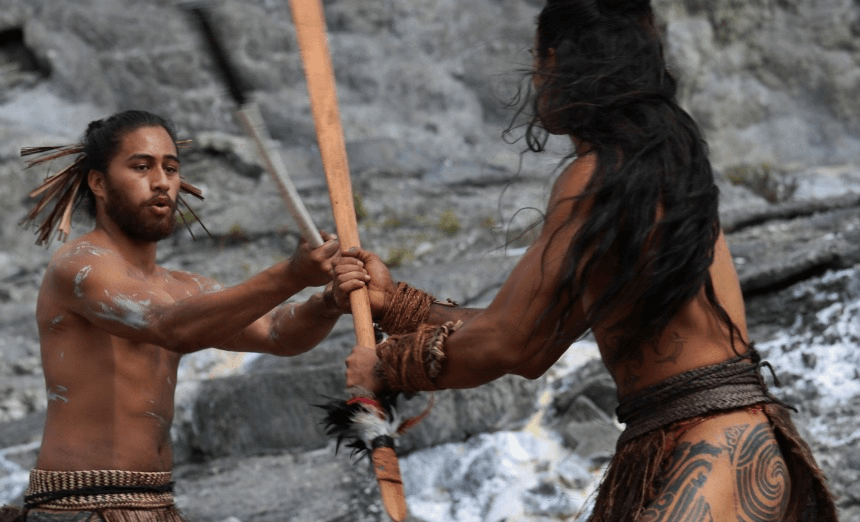TVNZ’s Filthy Rich cost $400k per episode to make, a pricetag 10 times that of Māori Television’s new drama Kairākau. Duncan Greive compares the two investments.
Earlier this week, I received an email from a person I’d never heard from before. “It would be good for you to do a comparitive analysis on the following low budget drama launching on Māori TV tonight,” it read, “and Filthy Rich. $40k per episode vs $1million? Per episode”
Now, to be fair to Filthy Rich, the show cost only $400,000 per episode. And Kairākau, which premiered on Wednesday, only runs for a half hour. Still, it seemed like an interesting idea: comparing the relative merits of the two shows, one of which costs nearly five times as much per minute as the other.
What would I find? Would the actors be more wooden? The sets less wooden? The dialogue crappier, the plot more contrived. Where exactly does the budget show?
More importantly, I would try and weigh the relative value for money New Zealand received from each venture. Is our nation five times the culturally richer for the existence of Filthy Rich, versus Kairākau?
I excitedly tuned in at 8pm to find out.
Things did not start out promisingly. The on screen graphics were somewhat below the level you’d expect of the in-built software of a mid-level modern laptop. The pixels bulged and shimmered, giving it the air of a school cert media studies presentation. They called to mind the excellent pick-a-path PC game Myst. Which came out in 1993.
Still, graphics aside, it looked ravishing. A young, fresh-faced Māori man in a vaguely Bear Grylls-y outdoors getup wandered through lush New Zealand bush. He spoke of his weapon transporting him into ancient worlds. The whole show is in Te Reo, subtitled into English, but in any language the strong impression was given that the man was under the influence of some heavy duty psychedelics.
He comes upon a small gathering of Ngāti Whakaue warriors in pre-colonial New Zealand. They have a rival captured, buried to his neck. Parched, eyes dead, mumbling incoherently.
To this point the show has been slightly impenetrable. A mix of dialogue and over-dubbed monologue, ancient and contemporary, with no real strong sense of what exactly it is we’re watching.
My wife, sat alongside me, suggests it reminds her of ’70s kung fu movies, and they are perhaps the best point of comparison: the ancient culture, the philosophically inclined aphorisms, the warrior’s code.
It only becomes more apt, as we flashback to the battle which preceded the poor buried bastard’s capture. A fierce fight conducted with taiaha on open, rocky ground. The action is electric, pacy and satisfyingly violent. Occasional attempts at Matrix-style slow-mo feel cheap and dated, but otherwise it’s impressively shot balletic action.
It contrasts nicely with the slow, eerie scenes at the camp. A tribal chief talks of his commitment to combat with a kind of Art of War absolutism. “Our weapons are here to guide us,” he says. And later, shockingly, “I have five children. They mean nothing to me.”
He is shown earlier trying to save them during a harrowing village invasion, so the words more indicate his willingness to sacrifice anything for his iwi.
The deeper into the show we get, the more satisfying it becomes. The episode is an exploration of the taiaha, both as a weapon and a symbol. At one point a captured rival is knocked unconscious with his own staff, which is then cruelly snapped in two. It feels as visceral as a death.
The device of having a modern man alongside, watching and sometimes interacting with the warriors is the least successful component. It feels forced, pulling you out of the ancient world. The plot is too obscure, feeling more like a series of moments than something with real narrative momentum.
For all that, though, whether racing in combat, or lost in contemplation Kairākau evokes a pre-colonial New Zealand in a convincing and evocative style. Particularly by comparison to the slick but ultimately empty Filthy Rich, which flaunts its wealth both as a production and a concept, but never feel remotely connected to this land or its people. Whereas Kairākau, despite its tiny budget and far more earnest intentions, could be from nowhere else.
This column is part of an ongoing series assessing our publicly funded television. Read part one, looking at the role of commissioners, here, and part two, comparing TVNZ with the BBC, here.
